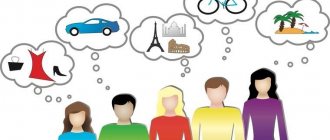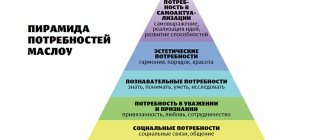Needs determine the life of mankind. Moreover, if they are not satisfied, people show impatience, and if they are fulfilled completely, they will become indifferent. More than 50 years ago, the authoritative American psychologist Abraham Maslow was able to structure our desires and needs into a general picture - a pyramid of human needs, which consists of 7 levels; there are more than enough examples of effective practical application of the theory in business and personal interests. She is admired and criticized at the same time. To learn how to use it, you need to understand the structure and patterns of its creation.
Maslow's theory - in brief
The researcher’s goal was the main incentives and motivators, understanding what is the main driving force and call to action. He expressed the idea that each of us has conditions for a comfortable life, we strive for them and achieve them. Something is more important for us, something is significant, but not paramount. Based on this conclusion, the psychologist built a hierarchy of necessary requirements. It includes physiological needs, safety, the desire to love and be loved, respect, status and self-actualization.
If basic aspirations are not satisfied, it is difficult for people to think about higher matters. When your salary is not enough for daily expenses, you work your butt off and don’t sleep at night to pay off your mortgage, you have no time to think about self-development, and you are unlikely to want to.
Authorship
Maslow outlined his thoughts in his treatise “Motivation and Personality,” published in 1954.
It is important that, in his opinion, the order of provision of necessary goods may vary from person to person, which is why he did not draw a diagram or present his concept in the form of a diagram. This was done by his students and followers. According to some sources, the author is F. Kotler, the writer of the handbook for marketers “Fundamentals of Marketing”; according to others, it is W. Stopp, who, five years after the author’s death, published a hierarchy of desires in his articles.
Table
At the heart of Maslow's pyramid are the basic human instincts, which psychology considered to be extremely important needs for a satisfactory standard of living. Surprisingly, the impulses of the soul were not taken into account until the mid-20th century, when an innovative psychologist started talking about them.
| Level | Definition | Brief explanation |
| Physiological | It unites what is naturally connected with human life and sociality. |
|
| Safety | The need to feel security and comfort for yourself and your loved ones. |
|
| Social | Includes communication, affection, family creation, joint activities. |
|
| Prestige and reputation | Reminds you of the desire to be needed and important, to respect yourself and receive recognition from society. |
|
| Cognitive (creative) | Expresses a desire for new knowledge, expansion of erudition and development of intelligence. |
|
| Aesthetic | Helps to achieve harmony and joy through beauty and art. |
|
| Spiritual | The highest level of needs for the harmonious development of personality. |
|
Psychologist Daria Milai
Make an appointment
Maslow's pyramid of needs: what is it?
Maslow's pyramid of needs is a hierarchical model of human needs, which reflects the essence of the motivational theory of hierarchical needs and is a somewhat simplified presentation of Abraham Maslow's ideas described in the work “The Theory of Human Motivation” (1943).
Maslow described his ideas in more detail in the book “Motivation and Personality ,” which was written in 1954. The first mentions of Maslow’s pyramid can be found in German-language sources from the 70s of the last century.
Maslow's pyramid, which is not depicted in the author's seminal article, is a schematic representation or diagram of all the needs of any person in a hierarchical order. The needs are placed as follows: the most urgent, basic and simple are at the bottom of the pyramid, and the most sublime and noble are at the top of the pyramid.
Why are there no diagrams in any of Maslow's publications? The point is that Abraham always regarded human needs as being of a dynamic rather than static nature. The author argued that this order can change depending on certain individual characteristics of each individual person. Under the same initial conditions, one person may feel that his need is completely satisfied, another - that his need is 50% satisfied, and a third - that his need is only 25% satisfied.
Maslow's pyramid of human needs
The approach associated with the assumption that people need to satisfy not only physiological needs, but also want to develop spiritually and be recognized, became revolutionary in the 40s of the last century. The scientist created a structure in which he highlighted:
- congenital (stages 1 and 2);
- acquired (starting from the second and above).
Further, he divided them into types:
- lower ones (it is necessary to satisfy them, otherwise we will not survive);
- higher ones, it is not so easy to satisfy them.
According to the theory, only 2% of people make it to the top of the pyramid. Its levels look like this:
- Physiology.
- Safety.
- Love and desire to be accepted.
- Respect.
- Cognition.
- Aesthetics (craving for beauty).
- Unlocking personal spiritual potential (self-actualization).
After Maslow’s death, his brainchild began to be used in marketing; it still attracts the attention of theorists and practitioners of psychology and business, causing a lot of controversy and adjustments. Modern approaches include, for example, models for a post-industrial society.
Physiological
Like any other living organism, for normal development, growth and existence, a person requires water, food, and air. He should be able to sleep, recuperate and go to the toilet. As a species, we continue our race and are influenced by hormonal surges.
While your stomach is growling from hunger, and your eyes are drooping from sleepless nights, you won’t be able to concentrate on work, creativity or reading. Maslow includes health, food, sleep, water and other innate needs as the first stage.
Face-to-face consultation
What are the features and advantages of face-to-face consultation?
Find out more
Skype consultation
What are the features and benefits of Skype consultations?
Find out more
Safety
It comes to the fore after providing physiological needs. This concept is multifaceted. It includes:
- physical protection from violence, attacks, wars, natural disasters;
- social stability and confidence in the future, which is determined by the presence of education, good work, pension;
- inviolability of private property, protection and insurance of one’s property;
- freedom from fear, confusion and confusion;
- law and order, clear rules and framework.
A person is designed in such a way that he prefers the known to the unknown, therefore he strives to obtain information and sees this as a guarantee of his security. And everything new takes root in society with difficulty. It’s not for nothing that we often use the expression: “Stability is an indicator of class.” We want to protect ourselves and our loved ones and continue to rise to the top of the pyramid.
Love/Belonging to something
At the new turn of the motivational spiral, love and friendship relationships become relevant. Their shortage is acute and is the most important need.
The feeling of loneliness and rejection torments, causing suffering. We strive to find a kindred spirit, a family in which we will be accepted and loved, like-minded people and friends.
Maslow identified deficiency love, which is addressed to others with the goal of getting something in return: sex, respect, a companion and being love, which is aimed at the inner world, interests and life of another person. She knows how to accept everything as it is, does not try to intervene and change, does not strive to possess the object of passion. So, having grown flowers and admiring their beauty, under the influence of existential love, you will leave them in the flowerbed, and succumbing to scarcity, you will cut them for a bouquet.
Respect
This is all connected with the desire to gain recognition and take an authoritative position in society. The desire for prestige involves people in the struggle for promotion at work, and encourages them to take up dancing, music, and fencing. It craves growth in self-esteem.
When others evaluate and approve of your actions and achievements, you become confident in yourself, get the opportunity to open up and use all your talents.
Cognition
The description of Maslow's 7-level pyramid does not end with this step, although in some versions it is the top. Exploring the world, searching for new paths and opportunities is one of the most powerful incentives for development and the desire to survive. The only way to overcome your anxiety about the future is to begin to control your destiny. Only then will fears turn into new opportunities, and ethereal experiences into real adventures.
I will help you overcome uncertainty and panic, just sign up for a personal consultation with me. As we learn, we are surprised and happy, because from early childhood we strive to learn something new.
Aesthetic
The value of beauty is that it can not only be seen, but also created. People are capable of decorating the world around them, making it brighter, more individual and more emotional. The desire to change the environment does not come to everyone, although we are all given the ability to see beauty.
No one is left indifferent by works of painting and architecture, music and literature.
Self-actualization
In simple words, the seventh stage is the happiness of being yourself. Maslow was sure that every person has his own path and cannot turn away from it. Then everyone will go about their activities and live in harmony with their inner world. Unlocking your potential is a lifelong endeavor. The paths to a favorite activity are varied, so it is at the high level of the pyramid that people’s motives are especially unique. Only a few reach the top, although everyone has the ability for self-realization. The researcher explained the reason for this phenomenon as follows:
- People do not know their capabilities, do not understand the benefits of self-development and doubt their own abilities.
- Society crushes us with its stereotypes and prevents us from realizing our talents.
- Fear of danger, taking actions that do not guarantee success.
Abraham Maslow's Inverted Pyramid
Everyone who has had to deal with management and marketing has heard about Abraham Maslow's pyramid of needs, but the greatest paradox of our time is that Maslow never drew it. Advertising masters came up with the idea of arranging human needs in the form of a staircase with clearly defined steps many years after the death of the scientist. And the professor himself, who has broken more than one spear in battles with psychoanalysts and behaviorists for the humanization of psychology and the emancipation of the individual, would probably be saddened to learn what purposes his ideas now serve.
Mother's curse
Abraham Harold Maslow was lucky enough to be born on the funniest day in the world - April 1, 1908. Nevertheless, he had no time for laughter in life: the early years of the scientist were spent in a Jewish town on the outskirts of the Russian Empire, where Cossack pogromists often visited. Tired of living in constant fear, the large Maslov family moved to New York, believing in the American dream. However, the reality turned out to be harsher: in the huge city, no one was waiting for the cooper Samuel, the family business was not going well, and soon the fugitives found themselves in the same hole from which they came: the inhabitants of the Brooklyn slums whistled after the Jews in the same way as the gray-legged Russian peasants.
The eldest son Abram suffered especially. When he came to school, from the first glance at the frail, quiet man with a guilty smile on his haggard face, it became clear to everyone that in front of them was a typical unresponsive “nerd”, whom it was a pleasure to bully. Maslow later recalled that his school years were little better than those of an upstart Negro who found himself in a privileged boarding school for whites. Although over time the young man reshaped his name in an American way, turning from Abram Maslov to Abraham Maslow, his pronounced Jewish appearance left no doubt about his origin.
Life was no better at home. The situation in the family exactly repeated the Freudian neurotic scenario: a weak-willed, henpecked husband and a domineering wife with the habits of a domestic tyrant. Desperate to get out of poverty, Abraham's father began to gradually decline and finally started drinking, leaving his wife, angry at the whole world, to take it out on their seven children. However, she herself probably believed that she was doing a good deed, instilling high moral ideals in the foolish ones, but in her worldview there was no place for either a loving Creator or grace. Therefore, Rosalia Maslow sometimes acted unjustifiably cruelly, like her God, punishing the children for the slightest offense, and her hypocrisy did not escape the quick-witted Abraham. All his life, the scientist quietly hated his own mother and did not even come to the funeral when she died. “My entire philosophy of life and my research have one common source - they are fueled by hatred and disgust for what she embodied,” the psychologist admitted. To begin with, in defiance of his mother’s religious insanity, Maslow became an atheist, and in his beloved humanistic psychology one can clearly see a challenge to the hysterical asceticism that reigned in the Maslow family’s Brooklyn closet: if God demands bloody sacrifice and self-denial, then this is a bad God.
But one should not imagine young Abraham as some kind of tyrant fighter: the boy, who became an outcast both at school and at home, was more like a hunted animal who found his only refuge in books and libraries. Since the mother, in yet another fit of hysteria, did not miss an opportunity to call her son a freak and a degenerate, for some time the young man was afraid to look in the mirror, and when he became a student at City College, he preferred to walk tens of kilometers, just so as not to go down to the city subway, where, as it seemed to him that all the passengers were doing nothing but staring at him.
The healing power of love
“Given my childhood, one can only be surprised that I am not mentally ill,” Maslow sneered. However, deep down in his soul, the scientist undoubtedly understood what force kept him from the yellow house: from the age of 16, he secretly sighed for his cousin Bertha. But what was the young man’s surprise when, having decided to open up, he heard in response not mockery, but passionate words of love. And when the well-bred Bertha gave Abraham his first kiss on his nineteenth birthday, the evil maternal spell dissipated like smoke. Now the lover was ready to fight anyone who encroached on their happiness. Despite the cries of indignant relatives, Abraham and Bertha got married and finally breathed freely. Contrary to all the horror stories about monstrous genetic anomalies awaiting children born in consanguineous marriages, they had two lovely girls, and the eldest daughter Helen also became a psychologist, conducting trainings and consultations on effective management and motivation of staff.
Having defended his love, Abraham also won the right to choose his own path in life. His father really wanted to see him as a successful lawyer, but the dry codes of laws made the inquisitive young man sad. In addition, while studying in college, Abraham was deeply impressed by the lectures of ethologist John Watson, who is considered by many to be the forerunner of behaviorism. Observing the habits of laboratory rats seemed like complete nonsense to the old cooper, but, fortunately, he had enough tact to treat his son’s interests with understanding, for which Abraham was immeasurably grateful to him. Later, having already become a professor at Brooklyn College, Maslow always found time to help the old man in the workshop.
Nevertheless, the young man decided to study away from his family and entered the University of Wisconsin, especially since another prominent ethologist worked there - Professor Harlow, who studied higher primates. Already in his second year, Maslow began working in his laboratory, selecting material for his dissertation on the sexual and dominant behavior of rhesus monkeys, thanks to which he received his doctorate ahead of schedule.
Soon, Edward Thorndike, tired of his fruitless search for an intelligent assistant, found out about the young talent. At the interview, the scientist suggested that Maslow take his own test, designed to assess learning ability without appealing to intelligence. To Thorndike's surprise, the young man scored a whopping 195 points, a level bordering on genius. That same day, Maslow returned to New York, taking up a position in the learning research group at Brooklyn College of Columbia University. Here he was expected to meet world luminaries: to escape Nazi persecution, the entire Frankfurt school came to New York. Maslow studied psychoanalysis with Erich Fromm and Karen Horney, and Margaret Mead and Ruth Benedict instilled in him an interest in anthropology and cross-cultural research that proved so irresistible that in 1943 the stay-at-home scientist went with restless ladies to the Blackfoot reservation "in North Carolina, dutifully enduring all the horrors of field life.
But most of all, Maslow became friends with Max Wertheimer, one of the first enthusiasts of Gestalt psychology (German “Gestalt” - “form”, “integral configuration”, Gestalt psychologists believe that experience is holistic and cannot be divided into its component parts): in Unlike their neo-Freudian colleagues, who focused on deviations, both friends were interested in issues of self-realization and personal integrity. “If you deliberately set out to become less of a person than your abilities allow you to be, I warn you that you will be deeply unhappy throughout your life,” Maslow instructed.
A stranger among his own
From intimate conversations long after midnight, the famous theory of needs arose, set out in Maslow’s first monograph “Motivation and Personality,” which saw the world in 1954. In fact, the book could have been published earlier, but the author had no luck with editors and reviewers all his life since then. Since, while studying youth sexuality at Brandeis University in Massachusetts, he had the imprudence to object to the authoritative psychologist Alfred Kinsey, saying that survey data was unrepresentative because boys and girls who refused to answer frank questions dropped out of the study. And then - off we go: a banal university quarrel stirred up the hidden contradictions that have dominated psychological science since the time of Freud: both the founding father himself and his students sinned by drawing far-reaching conclusions about human nature, guided only by observations of unhealthy people, maladjusted, depressed. A healthy, happy, accomplished person seemed to fall out of sight. “Human nature is better than is commonly believed,” Maslow argued. Over time, the passions subsided - the gentlemen psychoanalysts simply took the opponent out of their coordinate system, deciding to consider him a behaviorist, and only Kinsey harbored a grudge, turning all scientific publishing houses against Maslow. But then students stood up for their beloved teacher, declaring to the university leadership that they did not want to see anyone else as head of the psychology department, and 15 years later they brought Maslow into the chair of the chairman of the American Psychological Association. The scientist himself was never interested in corporate intrigues - the opportunity to do what he loved meant immeasurably more to him.
Maslow’s love affair with behaviorism, which was fashionable at that time, also did not last long. In general, the scientist shared the opinion of Watson and Skinner that the basis of every action is motivation determined by the desire for comfort by eliminating the tension that arises as a result of the discrepancy between what is desired and what is actually done. Tension gives rise to a need that a person tries to satisfy, gradually moving from basic needs to existential ones. So, first of all, we care about our daily bread; Having had our fill, we strive to secure our lair, and when there is food and shelter, we begin to think that it would be nice to bring someone else into our abode so that we have someone to share our joys and sorrows with. Following family well-being comes the desire to assert oneself in a wider circle - in the yard, on the street, in the city, and even throughout the world; and only then, in old age, after all the storms, needs of a higher order appear - for knowledge, for beauty, for self-realization. At the same time, Maslow admitted that different people have different priorities, and the order of satisfying needs can be modified: for example, an artist from Montmartre may eat too much and vegetate in obscurity, but will not give up his art. In addition, people's needs can be expressed to varying degrees: for one, recognition among friends is enough, while for another, one must certainly become a rock star. At the same time, unlike orthodox behaviorists, the scientist did not limit personal development to external motivations. In his opinion, the main difference between a person and an animal is the ability to generate obviously unsatisfied needs, not motivated from the outside, without limiting oneself to any boundaries.
In the belly of the whale
Maslow called a person who puts spirit above matter self-actualizing, seeing this not as an unfortunate exception to the rule, but as the only healthy norm of human existence. Every attempt to squeeze a person’s limitless inner potential into a rigid framework evoked a furious protest in him.
However, any spiritual aspect of human activity was incomprehensible to Skinner's technocratic thinking, and Maslow was accused of mysticism, forcing him to leave the department. “Don’t think that I am against behaviorism. “I am against doctrinaire,” the psychologist retorted. “I am against everything that closes doors in front of us and cuts off opportunities.”
However, in practice, self-actualizing individuals were rare. While developing a motivational program for the staff of an electronics plant in Del Mar, California, the scientist encountered a strange phenomenon: having barely secured a stable living wage, the workers completely lost the desire to expand their own boundaries.
Later in his book The Psychology of Being, Maslow called this phenomenon the “Jonah effect” - in memory of the biblical prophet who preferred to sit in the belly of a whale rather than carry the word of God to the wicked Nineveh. According to the scientist, the only thing that forces a person to put up with the limitations of the philistine shell is the fear of losing all previous gains, for which the market society asks an exorbitant price. In search of relief from fear, Maslow turned to transpersonal experience, which was later reflected in the monograph “The Farthest Limits of Human Nature,” published after the author’s death on June 8, 1970—his heart, torn to shreds by university battles, could not stand it.
Fortunately, the psychologist no longer saw how his ideas were picked up by those with whom he had fought all his life - professional manipulators feeding off the “Jonah effect.” If you look closely, at the root of all advertising lies an appeal to one of the basic needs, while higher-order requests are deliberately removed from the discourse - after all, they cannot be satisfied for money, although some manage to cleverly sell artificial substitutes... But that’s a completely different story.
Prepared by Anabel Lee, based on materials from psynavigator.ru; berichnov.ru
Violated needs
At each of the 7 steps of Maslow's pyramid, dissatisfaction can occur. It leads to diseases, disturbances in psycho-emotional balance, various disorders and ailments. Both mental and physiological factors are closely interrelated and complement each other. A person feels more cheerful, energetic and healthy when most of his aspirations are achieved.
Ask a question
Safety and security needs
As you move into the second level of Maslow's hierarchy of needs, the requirements begin to become a little more complex. At this level, safety and security needs become a priority. People want control and order in their lives, so this need for safety and security greatly contributes to behavior at this level.
Some of the basic security needs include:
- Financial support
- Health and wellness
- Safety from accidents and injuries
Finding a job, obtaining health insurance and medical assistance, depositing money into a Savings Account, and moving to a safer area are all examples of actions motivated by safety and security needs.
Together, safety and physiological levels of the hierarchy constitute what are often called basic needs
.
What is the meaning of Maslow's pyramid
The theory has found application not only in pedagogy and psychology, but also in marketing and management. There is something different for each direction:
- It contains a call to action for the majority of people. Did you eat, sleep, run? It's time to start self-development! There is no irony or sarcasm in this; rather, it is a hint and a vector of movement.
- Helps to identify real needs and not pay attention to those that have already been satisfied.
- Gives the right direction of knowledge - from simple to complex.
- Argues that there is room in life for different value systems, priorities and incentives. There is no universal action plan.
First stage: physiological needs
The needs of this category belong to those that are also called instinctive. They are the most basic, and it is to them that a person pays attention first. If he does not satisfy the desires of the first level, he simply will not be able to exist normally. An example is the feeling of hunger. It is unlikely that you will go to achieve success in business without first having a hearty breakfast. This level also includes:
- dream;
- oxygen;
- sexual desire;
- in addition to the food itself - water (drink).
Although these needs are important, they do not dominate the individual all the time. It is enough to satisfy them minimally to move to the next step in Maslow’s pyramid. Frequent diet breakdowns are also a good example.
The average woman who doesn't have a strong desire to lose weight will still relapse sooner or later because she has a need to satisfy her hunger.
A satisfied need ceases to motivate
We are talking about the degree of topicality, the timeliness of the realization of a particular desire. A sense of security does not push for even greater self-defense, recognition does not require further efforts to assert oneself, a large number of strong social connections does not lead to their endless creation and strengthening. When we achieve something, we need to go forward and look for what we did not manage to satisfy.
Second stage: need for protection
When a small child is afraid of monsters under the bed, he absolutely does not care what his peers think about him at that moment. The only thing he wants to do is call his parents for help. That's what he does. This is a manifestation of the needs of the second level: a person needs comfort. If he is not there, then he feels uncomfortable, cannot concentrate on doing other things, and becomes irritated.
This is why constant contact with mother or father is so important for a child. In loved ones you can see security, a faithful friend who will always save and support.
The popularity of religion is also due to the need for protection. Feeling the protection of higher powers, a person calms down, believes that everything is fine, and that help will definitely come if something bad happens.
Theory and practice
When using a pyramid, remember its conventions. Otherwise, the generalizations and conclusions you make may turn out to be wrong.
The sample used to build the model included people who were “ideal” or close to this concept. Maslow himself spent a long time and diligently selecting such respondents. Therefore, the results turned out to be “standard”.
Using the scheme to build a management motivation system will take the company to a new level without major investments. Each employee must receive stable pay in order to live and feel safe; participate in team activities to socialize and gain recognition and respect; have the opportunity to perform complex and responsible work within their competencies in order to develop and update themselves.
Criticism
The main arguments of supporters of the anti-Maslow movement are:
- The hierarchical ladder of priority does not correspond to reality.
- All aspirations can never be satisfied.
- It has not been confirmed experimentally.
Ed Dinner did a great job analyzing the famous model in 155 countries from 2005 to 2010. He came to the conclusion that the order in which needs are satisfied does not matter, and the provision of the listed benefits is associated with a feeling of happiness. Therefore, in general, Maslow's theory is correct.
Advantages and disadvantages
Pros of the model:
- convenient for self-analysis, provides an excellent opportunity to sort out your thoughts, structure your goals, and determine the point at which you are;
- will help you set life’s accents and priorities;
- will push you to choose a direction of activity;
- will teach you to better understand other people.
Minuses:
- is a theoretical approach without applied techniques;
- provides universal material from which there are always exceptions;
- is not considered the only correct concept of the pyramid of goals and needs.










